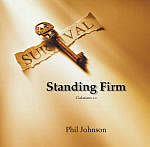The Benefits of True Knowledge
Aaron Burr, Jr. was less than two years old when his father, the President of Princeton, died suddenly and unexpectedly in September, 1758. A few months later Aaron’s grandfather, Jonathan Edwards, who had been elected President of Princeton to succeed his son-in-law, died from complications due to a small pox inoculation. A few months after that Aaron’s grandmother, Sarah Edwards died, and finally his mother, Esther Edwards Burr died. Thus in less than one year little Aaron Burr, Jr. lost both his parents and grandparents. By his teen years, during his studies at Princeton, Burr consciously and willfully rejected the faith of his parents and grandparents. Later he became Vice President of the United States, serving with President Thomas Jefferson.
Most historians call Burr a political scoundrel, the first in a long, sordid line of machine politicians. When people from his state of New York wished for him to run for Governor, his long time nemesis, Alexander Hamilton, spoke privately of Burr’s dishonesty and unfitness for office. When such information surfaced publicly Burr felt his character was besmirched and as was customary in that day, challenged Hamilton to a duel. Hamilton reluctantly agreed and when he chose not to fire his gun at his opponent, Burr had no such hesitation, killing him on the spot. Burr fled first to Maryland then to his good friend Colonel Butler on a plantation at what is now St. Simons Island, GA. Later, Burr was charged with sedition but acquitted. He is buried at the feet of his parents and grandparents in the cemetery at Princeton, this being one of his last requests, saying that he was unworthy to be buried beside them.
Young Aaron Burr, Jr. certainly faced very difficult tests of faith, and we may wonder how well we would hold up under similar ones. May I suggest, however, that tests of faith, hardship, and trial are normative in the Christian life? The question is, how well will you weather them? Paul, in Ephesians 1:17, after saying he makes mention of the Ephesian believers in his prayers, gives us the purpose for his prayer, that the God of our Lord Jesus Christ, the Father of glory, give them a Spirit (many commentators believe this is the Holy Spirit, see John 15:26 the Spirit of truth, Romans 8:15 the Spirit of adoption) of wisdom (applied knowledge) and of revelation (apocalypse, an unveiling or making known) in the knowledge (super-charged, abundant, experiential) of God. Paul knows how vital it is for these believers to grow constantly in the grace and knowledge of Christ.
If you live in New England or the Midwest then you know winter is coming. You must prepare for it. If you live on the Gulf Coast and you hear that a hurricane is coming, then you prepare. Likewise Paul, knowing the normative nature of the testings of faith, wants us to prepare for them, and this requires an abiding (Psalm 42:5), deepening (Psalm 139:1ff), growing (Psalm 73:28), and living (Habakkuk 3:17ff) knowledge of God. A superficial one (Psalm 73:10-14) or a stale one (Demas in Colossians 4:14, II Timothy 4:10) simply will not do.
Contrast John Winthrop with Aaron Burr, Jr.. Winthrop left for the New World in 1630 at the age of 42 and became the Governor of Massachusetts Bay. He came with a little over 300 people and within the first six months, 200 of them had died. His first two wives died from complications in child birth. Of his four daughters, three died in infancy and the fourth died in her twenties. His oldest son Henry drowned shortly after arriving in Boston. His younger son Forth, a promising candidate for the Puritan pastoral ministry, died shortly after John left for the New World. And his steward, due either to ineptness or dishonesty, nearly brought Winthrop to financial ruin. Yet in all these trials, these tests of faith, John and Margaret Winthrop never doubted God. He remained their one, true constant and abiding hope.
The greater your knowledge of God then the greater will be your peace. Jesus tells us at the end of the Sermon on the Mount (Matthew 7:24ff) that to listen and obey Him means to build our house on a rock, but not to listen means we build our house on sand. The storms of life are sure to come, and a house built on a weak foundation will be swept away. What are your testings of faith? Are you prepared to face the storms which are sure to come? On what are you building your hopes? To build on sand is to be man-centered, to view life fundamentally to be about your own comforts, desires, happiness, and prosperity. When you build in this way, without putting a growing, experiential knowledge of God as your foundation, then when the storms of life come you will be given to disappointment with God, disillusionment with your place in His plan, and despair over your future. But if you build with a growing, living, abiding, and deepening experiential knowledge of God then you will begin to see all of life’s circumstances as being under His sovereign control, that His primary aim in everything, including your salvation, sanctification, and glorification is His own glory. For a mere human to make such a claim is audacious and arrogant, but not so with the God of creation. He is in heaven and does as He pleases. He has established His throne in the heavens and His sovereignty rules over all.
May God give you a growing, living, deepening, and abiding experiential knowledge of Him. How can you get there? You can purpose to become a theologian of the heart by reading a good book or two on systematic theology. A good place to start is the Westminster Confession of Faith. But you should always look to Jesus. In Luke 7 we read of Jesus raising from the dead the son of a grieving mother. Such is the power of the Triune God. This power indwells every believer. You are to look in faith for His sustaining and sanctifying grace just as you did for your initial salvation. May God so work in us that the coming storms of life reveal a depth and viability of true knowledge of Him.
Al Baker is Pastor of Christ Community Presbyterian Church in West Hartford, Connecticut.





